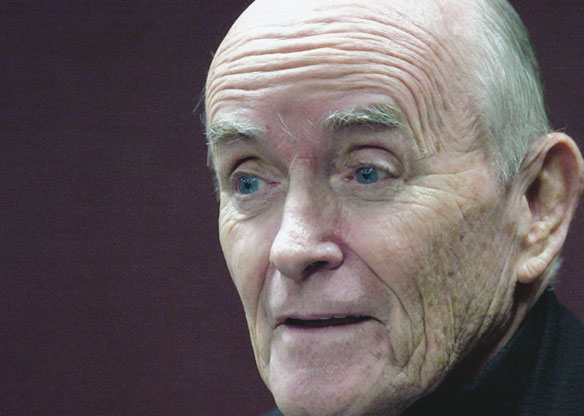by Father Robert Lauder
A FEW MONTHS ago, three of my priest friends died within a short space of one another. Each was a special gift in the life of the Church. All sorts of memories have come back to me since their deaths.
Bishop Sullivan

I first met Auxiliary Bishop Joe Sullivan when we were seminarians in the major seminary in Huntington, L.I. Joe was four years ahead of me. One of the first things that I learned about Joe was that he had played minor league baseball prior to entering the seminary. Joe was a pitcher, and as someone who had to face him in the seminary baseball games, I can attest to the fact that he was a very good one. I have a vivid image of a fast curveball coming at me.
In terms of his athletic talents, what is most vivid in my memory is Joe playing seminary football. He was his team’s tailback-passer, and I was my team’s tailback-passer. Each time we played, I felt I was involved in a special battle between him and me. Joe always won.
The same energy, intelligence and commitment that were so evident when Joe played sports were more evident in his almost 60 years as a priest serving the Church. I cannot even imagine the good Bishop Sullivan did, not only in the Diocese of Brooklyn, but on the national scene because of his knowledge of and dedication to the Church’s teaching on social justice.
During the last 20 years, Joe was a member of a priest discussion group that I have been moderating. Every priest in the group profited from Joe’s experience and insights.
Dr. Bernard J. Cooke
I first met Bernard Cooke when he was a very active Jesuit priest-theologian at Marquette University in Milwaukee. In 1965, Bishop Bryan J. McEntegart had sent me to Marquette to obtain a doctorate in philosophy to teach at Cathedral College Seminary, which he was in the process of building. When I arrived at Marquette, I discovered that in going for a doctorate, I was able to minor in another subject, which meant taking six of the 30 required credits in a subject other than philosophy.
Marquette’s philosophy chairperson tried hard to persuade me not to minor in another subject but to take only classes in philosophy. Because I had heard about what a great teacher Cooke was, I was determined to minor in theology, which, for me, meant to minor in Bernard Cooke. I took two courses with Bernard, and they were the best two courses I have ever taken with the best teacher I ever had.
Bernard had the enviable talent of being both deep and clear. I am not exaggerating when I claim that he changed my life. About a year or two after I graduated from Marquette, Bernard resigned from the active priesthood. Though I was very upset by his decision, I respected it and was certain that Bernard was following his conscience.
For the next 40 years, he continued to teach and write and serve the Church as an outstanding theologian. In fact, he wrote laudatory statements for the covers of two of my books.
Father Andrew Greeley

I first heard of Andrew Greeley in the summer of 1959. I think that was the time that he published one of the first of a countless number of essays about the Church. A man who was exceptionally intelligent, completely dedicated and apparently having an endless amount of energy, Andy was an important voice in the Catholic Church for more than 50 years until a serious accident in 2010 caused permanent brain damage.
That accident pretty much silenced a provocative thinker and prolific author who had written more than 120 books.
One of the humorous descriptions about Andy was that he never had an unpublished thought. Apparently, he also never had writer’s block.
In Father Greeley’s obituary in The New York Times, Peter Steinfels wrote the following:
“Religion, he argued, ‘is the result of two incurable diseases from which humankind suffers – life, from which we die, and hope, which hints that there might be more meaning to life than a termination in death.’
“Before religion became creed or catechism, he said, it was poetry: images and stories that defy death with glimpses of hope, and with moments of life-renewing experience that were shared and enacted in communal rituals.
“‘The theological voice wants doctrines, creeds and moral obligations,’ Father Greeley wrote. ‘I reject none of these. I merely insist that experiences which renew hope are prior to and richer than propositional and ethical religion and provide the raw power for them.’”
The deaths of Joe Sullivan, Bernard Cooke and Andy Greeley have reminded me what a great blessing friends have been in my life.[hr]
Father Robert Lauder, a priest of the Diocese of Brooklyn and philosophy professor at St. John’s University, Jamaica, writes a weekly column for the Catholic Press.
